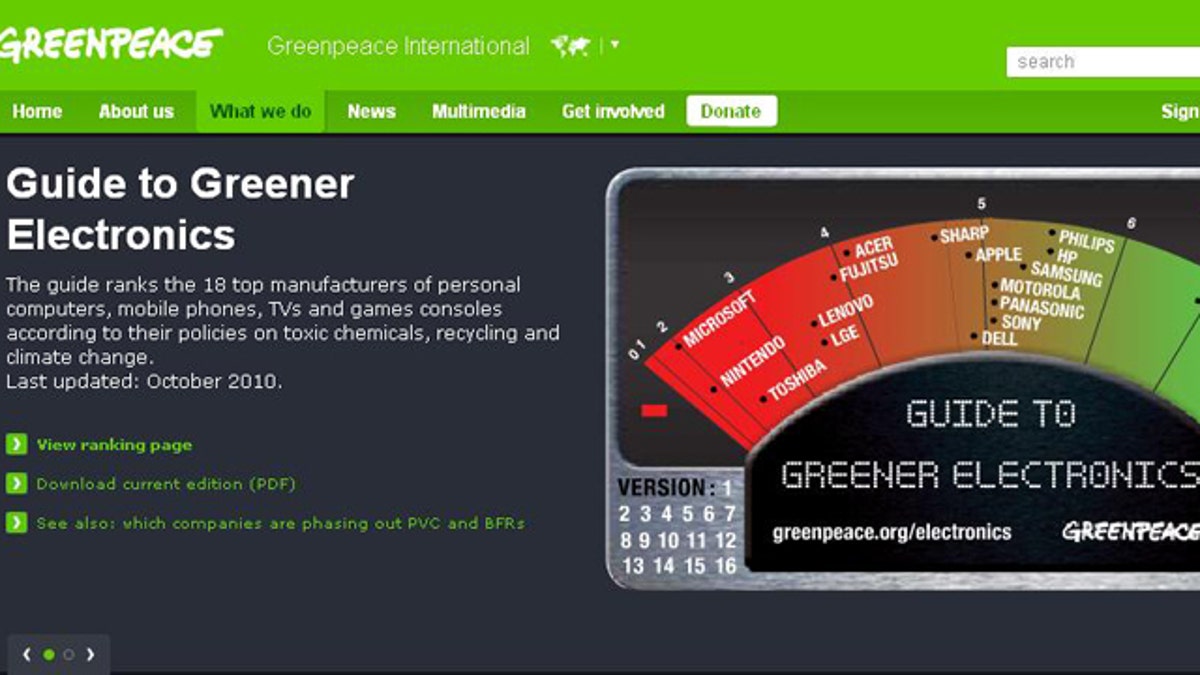
How to find the most eco-friendly companies? Many people turn to Greenpeace's Guide to Greener Gadgets, which ranks manufacturer's impact on the planet. (Greenpeace)
With Earth Day 2011 fast approaching, Americans are going green in record numbers. And not just modern hippies. Everyone.
"Up to 60 percent of consumers in the U.S. are making 'green' purchases," said Adriana Herrera of Fashioning Change, a company that helps people buy eco-friendly alternatives to mainstream brands that are more popular -- and sometimes naughtier, ecologically speaking.
In response, tech companies have redoubled efforts to co-opt the use of green language in their marketing initiatives. So how do you distinguish those that are riding coattails from those who truly care about the environment?
"A good place to start is a company's sustainability or corporate social responsibility report," Suzanne Fallender, director of sustainability at Intel, told FoxNews.com. "You can look at performance data over time and how the companies talk about their challenges and successes," she said. "Another useful resource is third-party ratings."
One of the most publicized resources is Greenpeace's annual Guide To Greener Electronics. Scandinavian companies take the top three spots, including Nokia, Sony Ericsson and Philips, followed by HP and Samsung. A mix of U.S. and Japanese multinationals dominate the middle of the list, and split the dubious last three spots: Toshiba, Microsoft, and Nintendo -- in that order.
But the guide ranks only personal electronics, however, making it an incomplete list. Furthermore, Greenpeace has been criticized for degrading companies that fail to comply with their requestS for information, instead of actually confirming which companies are neglecting Mother Nature.
The guide is a good indicator nevertheless, Herrera told FoxNews.com. "As a third party non-profit that is careful about where its money comes from, I'm much more inclined to trust Greenpeace's list over one published by a marketing company or magazine."
Any remaining doubts should be compared with other independent rankings, Fallender said. "While these lists aren't always perfect, looking at them collectively and over time can serve as a useful guide."
Look out for "greenwashing," however -- the act of making eco-claims for the purpose of a marketing advantage. "Some greenwashing tactics include vagueness, lack of proof and irrelevance," Herrera told FoxNews.com.
"Unfortunately, the aforementioned scoring systems can actually lead to increased greenwashing," she said.
If all else fails, you can always reduce your environmental footprint by shopping online. "Some of the most eco-friendly organizations include Amazon, Netflix and online media, whose online services reduce energy costs, storefront resources, paper waste, ink, and a while lot more," said Jeff Biley of Spectra Logic, a company which promotes old-fashioned tape backups over hard drives due to the energy savings.
Ultimately, the best way to identify green-conscious companies is to look for those that have nothing to hide, Jacqueline Latour of Nokia told FoxNews.com. "Transparency of environmental and sustainable actions are a good way to measure an organization's dedication and commitment," she said.
"At the end of the day, this is about all of us learning and becoming smarter about how we go about our daily lives ... it all boils down to education," she said.
Blake Snow is a freelance journalist, media consultant, and has difficulty not throwing used gum out the window of moving cars (sorry planet -- I'll redouble my efforts).
